If you are engaging in the practice of real estate service for properties you do not own, and you are not a duly licensed and registered real estate professional, chances are, you are violating the RESA Law. If you want to be sure you are not breaking the law, I urge you to continue reading.
I wrote this post because of a recent comment wherein the commenter described that they were tasked to find a property they can “lease and sublease”, and I hope this will serve as a gentle reminder for those who might not be familiar with the RESA Law or RA 9646, which covers such acts of engaging in the practice of real estate service.
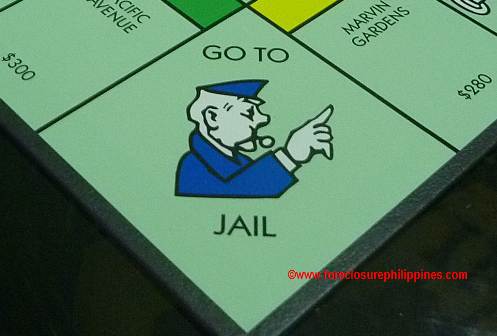 What can be considered as “engaging in the practice of real estate service”?
What can be considered as “engaging in the practice of real estate service”?
Based on Section 27 of the RESA Law, acts constituting the practice of real estate service are as follows:
“Any single act or transaction embraced within the provisions of Section 3(g), Rule II hereof, as performed by real estate service practitioners, shall constitute an act of engaging in the practice of real estate service.”
Furthermore, Section 3(g) states that:
“g. “Real estate service practitioners” shall refer to and consist of the following:
(1) Real estate consultant – a duly registered and licensed natural person who, for a professional fee, compensation or other valuable consideration, offers or renders professional advice and judgment on: (i) the acquisition, enhancement, preservation, utilization or disposition of lands or improvements thereon; and (ii) the conception, planning, management and development of real estate projects.
(2) Real estate appraiser – a duly registered and licensed natural person who, for a professional fee, compensation or other valuable consideration, performs or renders, or offers to perform services in estimating and arriving at an opinion of or acts as an expert on real estate values, such services of which shall be finally rendered by the preparation of the report in acceptable written form.
(3) Real estate assessor — a duly registered and licensed natural person who works in a local government unit and performs appraisal and assessment of real properties, including plants, equipment, and machineries, essentially for taxation purposes.
(4) Real estate broker – a duly registered and licensed natural person who, for a professional fee, commission or other valuable consideration, acts as an agent of a party in a real estate transaction to offer, advertise, solicit, list, promote, mediate, negotiate or effect the meeting of the minds on the sale, purchase, exchange, mortgage, lease or joint venture, or other similar transactions on real estate or any interest therein
(5) Real estate salesperson – a duly accredited natural person who performs service for, and in behalf of a real estate broker who is registered and licensed by the Professional Regulatory Board of Real Estate Service for or in expectation of a share in the commission, professional fee, compensation or other valuable consideration.”
In a nutshell, if you are doing any of the acts or rendering the services of a real estate consultant, real estate appraiser, real estate assessor, real estate broker, or real estate salesperson as described above, then you are already engaging in the practice of real estate service.
Who are exempted from the RESA Law?
The very controversial Section 28 of the RESA Law defines what can be considered as exempted:
“SEC. 28. Exemptions from the Acts Constituting the Practice of Real Estate Service. The provisions of R.A. No. 9646 and the IRR shall not apply to the following:
(a) Any person, natural or juridical, who shall directly perform by himself/herself the acts mentioned in Section 3 hereof with reference to his/her or its own property, except real estate developers who are regulated by and registered with the Housing and Land Use Regulatory Board (HLURB) pursuant to law and other resolutions/regulations such as but not limited to Presidential Decree (PD) 957, as amended, and Batas Pambansa Blg. 220 and their Implementing Rules and Regulations;
(b) Any receiver, trustee or assignee in bankruptcy or insolvency proceedings;
(c) Any person acting pursuant to the order of any court of justice
(d) Any person who is a duly constituted attorney-in-fact for purposes of sale, mortgage, lease or exchange, or other similar contracts of real estate, without requiring any form of compensation or remuneration; and
(e) Public Officers in the performance of their official duties and functions, except government assessors and appraisers”
I have said it before and I will say it again, If you own a property, you are exempted from the RESA Law, unless you are a real estate developer. If you don’t own a property and you are engaging in the practice of real estate service in regard to that property (like leasing and subleasing for example), you need to be a licensed real estate professional!
What is prohibited?
Let me quote Section 29 of the RESA Law below:
“SEC. 29. Prohibition Against the Unauthorized Practice of Real Estate Service. No person shall practice or offer to practice real estate service in the Philippines or offer himself/herself as real estate service practitioner, or use the title, word, letter, figure or any sign tending to convey the impression that one is a real estate service practitioner, or advertise or indicate in any manner whatsoever that one is qualified to practice the profession, or be appointed as real property appraiser or assessor in any national government entity or local government unit, unless he/she has satisfactorily passed the licensure examination given by the Board, except as otherwise provided in R.A. No. 9646 and the IRR is a holder of a valid certificate of registration and professional identification card or a valid special/temporary permit duly issued to him/her by the Board and the Commission; and, in the case of real estate brokers and private appraisers, they have paid the required bond as provided for in R.A. No. 9646.”
What are the penalties?
Section 39 clearly defines the penalties for violations:
“SEC. 39. Penal Provisions. Any violation of R.A. 9646, including violations of this IRR, shall be meted the penalty of a fine of not less than one hundred thousand pesos (P100,000.00) or imprisonment of not less than two (2) years, or both such fine and imprisonment upon the discretion of the court. In case the violation is committed by an unlicensed real estate service practitioner, the penalty shall be double the aforesaid fine and imprisonment.
In case the violation is committed, by a partnership, corporation, association or any other juridical person, the partner, president, director or manager who has committed or consented to or knowingly tolerated such violation shall be held directly liable and responsible for the acts as principal or as a co-principal with the other participants, if any.”
Why should you take this seriously?
Let me try to make the penalties clear for everyone:
- Any violation: Php100,000.00 or imprisonment of not less than two (2) years, or both
- Violation is committed by an unlicensed real estate service practitioner: the penalty shall be double (that would mean Php200,000.00 or imprisonment of not less than four (4) years, or both!)
I highly suggest further reading about the RESA Law through the following articles:
- RESA Law IRR published last July 24, 2010
- Approved and published RESA Law IRR full text
- 4 perfectly legal ways to be a real estate investor with the RESA Law
Be very careful!
Just be very careful when someone tells you to do something related to real estate as you might be breaking the law. When in doubt, don’t be afraid to ask questions, and use good old common sense. Besides, I believe the RESA Law and the RESA Law Implementing Rules and Regulations or IRR is fairly easy to understand.
Ever since the RESA was signed into law last year, whenever I meet with other beginning real estate investors, I often end up harping about its implications on activities such as selling other people’s properties, which I believe has become illegal if done by those who are not duly licensed and registered real estate professionals.
There is simply no excuse for anyone to be ignorant of the RESA Law and how it affects everyone doing just about anything related to real estate.
As the famous legal principle says,
“Ignorance of the law excuses no one.”
~~~
To our success and financial freedom!
Jay Castillo
Real Estate Investor
PRC Real Estate Broker Registration No. 3194
Blog: https://www.foreclosurephilippines.com
Follow me in Twitter: http://twitter.com/jay_castillo
Find us in Facebook: Foreclosure Investing Philippines Facebook Page
Text by Jay Castillo and Cherry Castillo. Copyright © 2011 All rights reserved.
Full disclosure: Nothing to disclose.



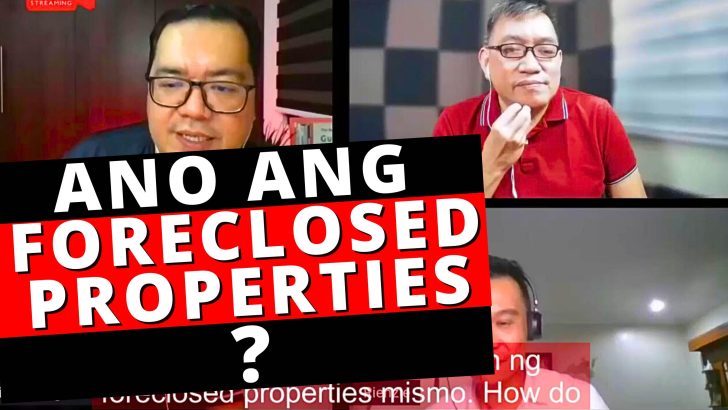
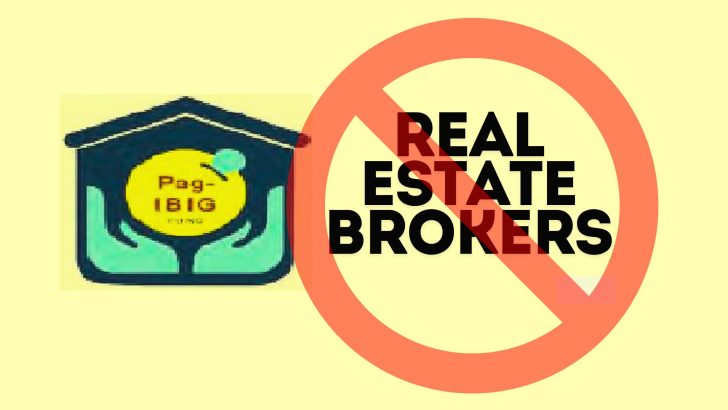
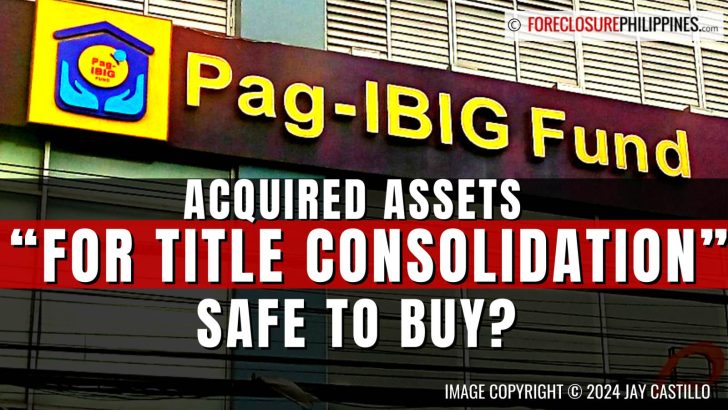
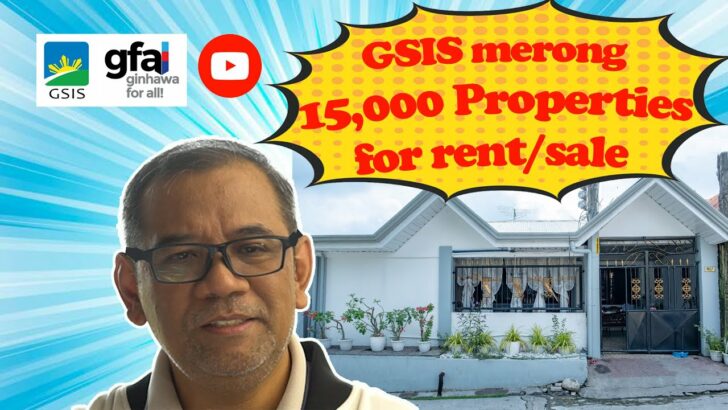
![Why invest in foreclosed properties in the Philippines? + Top things to consider [Video] 5 Why invest in foreclosed properties in the Philippines? + Top things to consider [Video]](https://www.foreclosurephilippines.com/wp-content/uploads/2023/03/video-how-to-invest-in-foreclosed-properties-in-the-philippines-v3-728x410.jpg)

Pingback: Top 15 Reasons Why I Stopped Brokering Foreclosed Properties
Pingback: Why You Should Never Give Cash To Real Estate Agents (And What To Do Instead)
A pleasant morning to you Jay. I’m a Licensed Real Estate Broker
I got a copy of FREE GUIDE TO REGISTRATION OF YOUR BUSINESS/INDIVIDUAL PROFESSION of Atty Perez I got a link from one of the posts here in ForeclosurePhilippines.com
May clarification lang po sana ako Atty. I opted to register my name with the Bureau of Internal Revenue (BIR). ang nasa OR ko po is my complete name and may address (unit is residential commercial).
RA 9646 states the following:
“Section 33. Display of License in the Place of Business. – Every registered and licensed real estate service practitioner
shall establish and maintain a principal place of business and such other branch offices as may be necessary, and
** I am renting a residential commercial unit. and ito na rin ang ginamit kong address sa OR and registered sa C.O.R
shall conspicuously display therein the original and/or certified true copies of his/her certificate of registration as well as the certificates of registration of all the real estate service practitioners employed in such office.”
** already displaying C.O.R and CERTIFICATE OF LICENSE BROKER. I also paid the PTR
I have the principal place / office O.R. under may name
However, when I went to DTI need ko daw po mag register with Business Name para makakuha ng DTI PERMIT. diba po option naman natin pwede gamitin NAME natin, yun din po nabasa ko sa guide naemail sa akin e-book of ATTY Perez.
Then, pumunta po ako sa MAYOR’S OFFICE hiningian din po ako ang DTI pra daw makakuha ng Permit. Ang gusto ko po sana to get a Permit to Operate or any Permit na pwede ibigay coz sa office saan ako nagrerent at nagstay (home-based/residential commercial unit) I bought computer 7 units to be used for basic training ONLINE MARKETING and sa RECRUITMENT ONLINE ng mga AGENTS. Ganun, din po pumunta ako sa BARANGAY HALL ay hingian din po ang ng DTI AND MAYOR’S PERMIT.
If ganun po uulit nanaman ako pupunta sa BIR to get new set of O.R. / REGISTER BUSINESS NAME etc. Asks ko lang if KAILAINGAN PA RIN PO BA KUMUHA NG DTI / MAYOR’S PERMIT / BRGY PERMIT? or anong PERMIT po need ko kunin coz the requirement for licensed real estate service practitioner shall establish and maintain a principal place of business.
Hoping for your immediate response. Thank You
Hi Jay. Suppose I will organize a corp composed of retired bankers, lawyer, insurers & people knowledgeable about realty estate business. All of the incorporators are non-licensed real estate service practitioners. We will just outsource the services of licensed realty service practitioners who will perform such tasks in the name of the corp. Will this set up be a violation of the new RESA Law?
Pingback: Is BIR RR No. 10-2013 Favorable To Violators Of The RESA Law? - ForeclosurePhilippines.com
Hi,
I would like to know how to release an accredited salesperson under my license. Can you please help me on this. Thanks
Emmanuel
Jay,
Hi! Happy New Year!
Recently the Civil Service Commission issued Memorandum Circular no. 20 regarding the qualification standards for Government Assessors and Appraisers in connection with the implementation of the RESA Law. In the circular it stated that Government Assessors and Appraisers who are not yet licensed but were appointed to permanent status prior to the implementation of the law shall not be disturb (meaning they could continue to perform their function), but they could not be promoted to the next higher (Assessor / Appraiser) position unless they are licensed. But since the second paragraph of Section 30 of the RESA law mentions “Government Assessors” only, does this mean that Government Appraisers are not covered in the second paragraph of Section 30? Will the CSC Memorandum no. 20 contradict with Section 30 of the RESA Law?
Thanks.
Glen
Hi jay,
i am working with the government bank and was assigned in the property valuation doing appraisal work for more than 15 years. when RESA was implemented, i took CPE seminar to comply the required number of units since i was qualified in the grand father clause – license without written examination. i passed the first PRC real estate brokers examination but did not take the written examination for appraisers. what for? i am qualified for the grand father clause… anyway…i submitted all the required documents to PRC (application for a licensed appraiser without written examination) before the deadline of submission in July 2011. Until to this date, i haven’t any news, information or any advice from PRC regarding the status of my application. Recently, i heard news that there’s a problem in the approval/issuance of appraiser’s licenses in the PRC. I assumed you know the probllem.
Today, i am awaiting the result of my application. But sad to note, that the delay in the processing of my application hampers a lot in my work assigments considering i cannot sign nor appraised property under the implementation of RESA LAW.
Question.
1. Can i still perform appraisal works even pending application for licensed
appraiser(without written examination) with the PRC?
2. If i will continue doing appraisal works, do i violate the RESA Law considering
it’s more than a year now waiting for the approval of my application with the
PRC?
3. If i will always wait for the approval of my application for license appraiser, what
will happen to those properties mortgaged in favor with the the bank that needs
periodic appraisal? Hired licensed appraiser which i believed additional
expense with the bank?
Your sharing to this query is highy appreciated.
Thank you.
Dudz Estacion
Butuan City
Hi Im a licensed real estate broker since 2007 but already have a PRC License . I appreciate your comment on ARE YOU VIOLATING THE RESA. Sad to say as of now there are still unlicensed persons who practice real estate in the Phils though already knowing the RESA.. Its hard for me to bluff them coz we know each other and they just continue to practice. I advice them to make seminar but they hve no money. I just want to know what can the PRBRES do to look for these unlicensed practitioners so that we the licensed really feel the effect of the RESA thanks.
ERMEL C. CABA CRB
PRC# 0737
Hi Jay,
Ask ko lang po sana about this RESA law kasi nag work kami online ng husband ko and we are very much familiar on how it works online especially for marketing and commercial purpose ng kahit anong work meron din doon real estate pero hindi dito sa Phil sa ibang bansa.
Basically ang concern ko po kasi if we decide with my husband to host an online site where we can allow real estate brokers or agents or direct people na mag post ng kanilang mga bahay, condo or lot na “for sale” and we ask this brokers a monthly pay…are we liable in any matter of violating this law?
Your answer will really be of help po sir.
Thanks.
Hi Elai, I don’t see any problem with what you plan to do. My suggestion would be for you to make sure the brokers/sales persons on your site will indicate their PRC license/registration numbers, which you also need to verify, just to make sure these are valid and really belong to them. I’ve read about unscrupulous individuals who use the license number of other brokers on classified ad websites. Good luck!
Hi Jay.
We are a realty service provider in West Mindanao, We are active in property appraisals and re-appraisal of foreclosed assets, financial/estate planning, SPAV sales, et5c.
I think we can share mutually beneficial collaboration. What are your thoughts on thsi?
Regards.
Jim Punzalan
Hi Jim, sounds interesting! Let’s discuss directly through e-mail. Thanks!
Hope we can start on the Zamboanga Pen first, thence to cover the whole of Mindanao.
Mr Jay
Ma iba naman, magtatanong lang sana ako regarding sale of a parking slot in a condominium. The Parking slot being sold in the building or condominium to a fellow unit owner is annotated at the back of the title of the sellers titled unit. Gusto nyang ibenta ang nasabing parking slot lang and not the unit. Pano ba magagwa yun e walang sariling title ang parking. Unlike in other condominiums separate at may sariling title ang parking slot.
ano ba dapat gagawin pag ganito?
Hi Hector, so parang assigned parking slots lang siya right? I would suggest to check with the condo corp/admin, they should know how to handle this kind of transaction as I can imagine transferring assigned parking slots would be quite common. Let us know how it goes, thanks!
I’d like to ban them and take necessary steps to completely discourage them from practicing real estate but i do not know where to start. They don’t seem understand RESA. Starts, Honobono and Housing Interactives are being managed by foreigners.
Hi Jay,
I am also a Real Estate Broker but works as a full time Leasing Manager of The Enterprise Center Makati. I often end up arguing with a handful of Realty companies wherein they have no blanket license which the likes of CBRE, Jones Lang LaSalle Leechiu, Colliers has secured. What they have are just the SEC documents and Business Permits indicating that they do engage in real estate practice.
To name a few of these realty companies which do not have a blanket license are: (—–deleted by admin, possibly libelous——). They are not property developers, but employed 1 or 2 real estate brokers whose licenses they use to collect fees from the Landlord.
Pingback: How to verify a Real Estate Broker License — Foreclosure Investing Philippines
Hello Sir Jay,
Our real estate organization, wherein I wont mention the developer, is still quite small, but we’re marketing a high end project. The sales team consists of a broker manager, assistant manager, and 6 sales people who are all either licensed brokers or accredited sales persons. However, we’re all reporting to the Real Estate division manager who is a foreigner and not licensed and also signs on all legal sales documents which are notarized.
My question is does this violate the RESA law?
Thank you!
gud am sir, i supposed to be promoted to Local Assessment Operation Officer III of City Assessor’s Office, Mati City, but they find me licensed as appraiser, is it covered in the civil service commission as one of the requirements? i’m referring at present wherein resa law was approved a year ago. tnx sir jay. . . can i have a speedy answer? God bless. . .
Busy yata si Jay so I’ll answer. I think you need to be licensed as a real estate assessor also. You should’ve registered as an assessor last July. Pwede pa sana without examination.
The RESA law became effective in July 2009. The IRR was released last year. The provision in Sec 20 expired last July 2011. Unfortunately, you may need to take an exam to get licensed as an assessor.
Is it a requirement of the Civil Service Commission? The CSC is compelled to follow the law so I’m sure it’s a requirement now.
You can check the Section 20 here. https://www.foreclosurephilippines.com/2011/05/what-is-the-grandfather-clause-of-the-resa-law.html
Hi Jay, if my company owns an apartments listing website, are we required to have a broker onboard ?
Hi Jay. Is depreciation cost also important in assessing the value of the property? Can you give us information regarding DEPRECIATION? Tnx and more power!
IT’S REALLY UNDERSTANDABLE
Alam ninyo guys., others will be defensive if in someways the truth what they are doing is against the law pala. …. especially if they have no intention to do wrong and just want to earn a living either full time or part time by selling or referring real estate to or for a buyer or a seller, even without a broker’s licence.
Di ba., its really a common practice? This is really happening!!!
Pero if sometimes you have been in practice of such things and someone will tell you what you are doing is inconsistent with the law then that’s like a slap on the face! Either you will jerk violently and be furious about it., or you will either defend your practice by creating mistakes by other people, or simply qualify right things as “parody”…, OR perhaps you will just be humble enough to accept the law are facts that are not exclusive for interpretation but rather meant for everybody as guide to change our ways.
With or without academics of being a judge or being a lawyer, common sense is telling me there are sound reasons for this laws and it is written not base on interpretation but as a line to spell what is right and what is wrong.
Wala lang thinking aloud…
Ei
For a very serious topic, I find myself laughing reading the comments. Thanks for the reminder, Jay and Cherry. You’re one formidable team. 🙂
You can say that again Ronald! Someone even said this post was a parody… haha!
Thanks Ronald! You and Weng also make a great team!
When is the next RESA law seminar in Cavite?
Hi Josephine,
I believe most CPE seminars being offered by various PRC accredited CPE providers/real estate broker organizations should include the RESA law as one of their topics. I guess the challenge would be finding a seminar in Cavite. I did a quick search and found one offered by PAREB but it was conducted last July. Why don’t you try calling them up to check if they have a new schedule? Their contact numbers can be found on this link: http://www.sulit.com.ph/index.php/view+classifieds/id/3779860/CPE+Seminar+for+Real+Estate+Salespersons+or+Agents+%28Dasmarinas%29?referralKeywords=cavite+cpe
Ang alam ko., if you post as a lawyer or claim you are a lawyer and you are not., parang iyon iyong illegal. If you practice law, like provide notary public duties., or you sign a public documents as a lawyer or for a lawyer, thats the illegal practice.
Iyong may actual practice of law., but if you talk about laws specially about the laws with in your field? Like ang mga doctors may mag batas rin that governs their practice., or like engineers., or mga teachers., etc., we can talk about it. Kasi it has relationship with our field Sir Mike.
But if you are citing a law and explaining it in the easier words possible., i think thats not being a lawyer, that is just being a writter., ok lang iyon Sir Mike. I appreciate if someone will explain legal things to us., in the simplest word possible. PEACE!
Very well said Eireen, thanks for sharing!
Are you a lawyer? If not, by writing such blog about laws, you are engaging in the illegal practice of law. Be warned: “A little knowledge is a dangerous thing.”
Hi Mike,
Thank you for your concern. I agree with Ms. Eireen though, I believe there’s nothing wrong with Jay writing about laws that affect the real estate service profession, since he is a licensed real estate broker. He never claimed that he is a lawyer anyway, and the site has always had a disclaimer (which, by the way, you can access at https://www.foreclosurephilippines.com/terms-of-use/disclaimer). If you believe that the above article is erroneous, notwithstanding that Jay only quoted from the law, please do enlighten us.
I can’t help but ask, are you a lawyer yourself? Baka kasi you just came across the term “illegal practice of law” and immediately concluded that “by writing blogs about laws” Jay is engaging in the illegal practice of law. Ikaw na rin ang nagsabi, “A little knowledge is a dangerous thing.”
Best regards,
Atty. Cherry Vi Saldua-Castillo
Hi Mike, you got that right when you said “a little knowledge is a dangerous thing.”, which is why I wrote this. It seems people might end up doing something illegal simply because they have little knowledge of the RESA law. I just can’t turn a blind eye on that. As a licensed real estate professional myself, I believe it is my duty to help people become aware of this law which directly concerns my profession/industry. What do you think?
Besides, I wrote this as a reminder, not as legal advice, similar to what I have stated in this blog’s disclaimer. Nevertheless, I can assure you that whatever I write here, especially those that tackle real estate laws, are reviewed and will get inputs from a lawyer who happens to be a licensed real estate professional as well.
Anyway, I appreciate it that you shared your thoughts here. Cheers!
Helpful reminder to everyone. Thanks for this Jay.
You’re welcome Neil, thanks for dropping by!
Hi Sir Jay!
Thanks for your helpful site. We learn a lot from it.
The Provisions of the RESA Law also covers the brokers of Bank Foreclosed Properties right?
Some banks “employ/accredit” brokers who are not really brokers.
These people are not licensed with the PRC, yet they act as one and very arrogantly.
They are unscrupulous in their practice and give bad reputation to respectable brokers. Can licensed real estate practitioners go after them?
PRC Real Est Board can also remind these banks to adhere to the policy of the RESA Law allowing only Licensed Practitioners (Brokers) to mediate the sale of their inventories right?
Please correct me if i am wrong…
lucky baker
Hi Lucky baker,
Yes, I also believe that the RESA law covers real estate brokers who focus on bank foreclosed properties.
I noticed that most banks nowadays will only accredit PRC registered licensed brokers. It seems most banks are already aware of the RESA law and are doing their part to adhere to it.
I agree with you that those unlicensed brokers or “colorums” who also act arrogantly, give real estate brokerage a bad name, and is detrimental to those who act “professionally”. I just hope the PRC will come up with formal guidelines on how such illegal activities can be reported and dealt with.
Thanks for dropping by, cheers!
sir,
good day!
i took the review and successfully passed the real estate board exam last march 2011 though i have no prior experience on real estate services/dealings. i have a friend who also took review but did not pass the exam. However, he is requesting me to accredit him as saleperson. can you please give me an overview on what documents and procedures needed at PRC in accreditation of salesperson?
maraming salamat!
Hi Robi,
I myself am waiting for the PRC/PRBRES to release the exact procedure on how to register sales persons. I will surely share this here when it becomes available.
Thanks for the comment, cheers!
Thank you Sir,
That was helpful.
You’re welcome Jonathan, have a great day!
This is very interesting, nice of you to hi-light what is important and explain the fundamental principle behind real estate brokerage as a profession. Honestly before when i meet real estate agents/brokers i try to run away or avoid any form of conversation, perhaps because before i cant afford to buy any property and—-REALLY please excuse me no offense to anyone, but before there was a stigma embracing the profession, HARD SALE stigma, i could be wrong but i do have that impression at least true with me.
Because of this blog, very concise write up, well written, and very educational my respect for LICENCE REAL ESTATE BROKERS as an honourable profession is renewed, perhaps RESA the awareness and understanding of it will define who should i run away from and who should i talk to about my personal real estate investment.
Thank you SIR JAY., another 5 star write up for me.
Hi Eireen,
You are really humble! I’m sure you can afford to buy a lot of properties now. 🙂
Yes, I know what you mean, there are a few in the industry that are like that and they give real estate brokers/agents a bad name. I just hope that duly licensed real estate professional will continue to strive for professionalism and conduct business in an honorable way, as you said.
One more thing, no need for “Sir”… hehe. Cheers!
This is a good reminder Sir Jay. Just like anybody else, I can not imagine myself being held behind bars because of ignorance for the law does not recognize it nor excuses no one.
Thanks Manny for the comment. Yup, and it is really not that hard to operate within the bounds of the Law so it really is not worth it to risk being jailed. By the way, just call me Jay, no need for “Sir”.
I guess some beginners are not aware of the RESA, but, thanks to this friendly reminder, they’ll be guided and informed accordingly 🙂
I hope so Argel. Aside from awareness, I also wish people will do what is right. Cheers!
Ok Mike if you wish to enlighten us about the law and not everyone can afford a lawyer are you willing to give us legal advice on a “pro-bono” basis, assuming you are a lawyer. I think a little “yes” from your end will be just as dangerous.
Im not a lawyer, and had I been one, why should I? If your tooth hurts but you can’t afford the services of a dentist, would you go to your barber or hairstylist to pull-out your tooth? I am not preventing you from seeking Jay Castillo’s legal opinions. I just said that just because he has some knowledge about real estate business, he can talk about the laws governing real estates. Technically, it may not be prohibited, but prudence dictates otherwise. I also find a parody in his article. He was very specific against unlicensed brokers/agents practicing the profession endowed exclusively to licensed brokers/agents. By doing so however, he encroached into interpretation of laws which should be better restricted to lawyers and judges. Put it otherwise, can a lawyer who has some knowledge about real estate laws practice as a real estate agent or broker without the specific license? Leave the selling to the brokers and agents, the interpretation of the laws to the lawyers and judges.
Dear Mike,
I would appreciate it if you would read all the comments as well as the disclaimer thoroughly. I think that everything was explained very clearly and if you still cannot understand them, then sadly, no amount of explanation will ever get through to you.
To reiterate, I wrote the article as a reminder and not as legal advice. It is my point of view as a licensed real estate broker, and I believe that as such I should be knowledgeable about the laws that affect my profession. If we follow your line of reasoning, then even the Honorable members of the PRB-RES have no right to talk about the RESA Law just because they are not lawyers. That is absurd.
And lastly, if you are referring to my wife when you said “xxx can a lawyer who has some knowledge about real estate laws practice as a real estate agent or broker without the specific license?”, I would like to inform you that not only is my wife a CPA and a lawyer, she is also a licensed Real Estate Broker (REB). In fact, she placed fourth in the March 2011 REB exam.
I hope that this puts this matter to rest.
Cheers!
im a lawyer and a real estate broker at the same time. and i very much agree with this article..
Thank you Jeybs for the feedback, cheers!